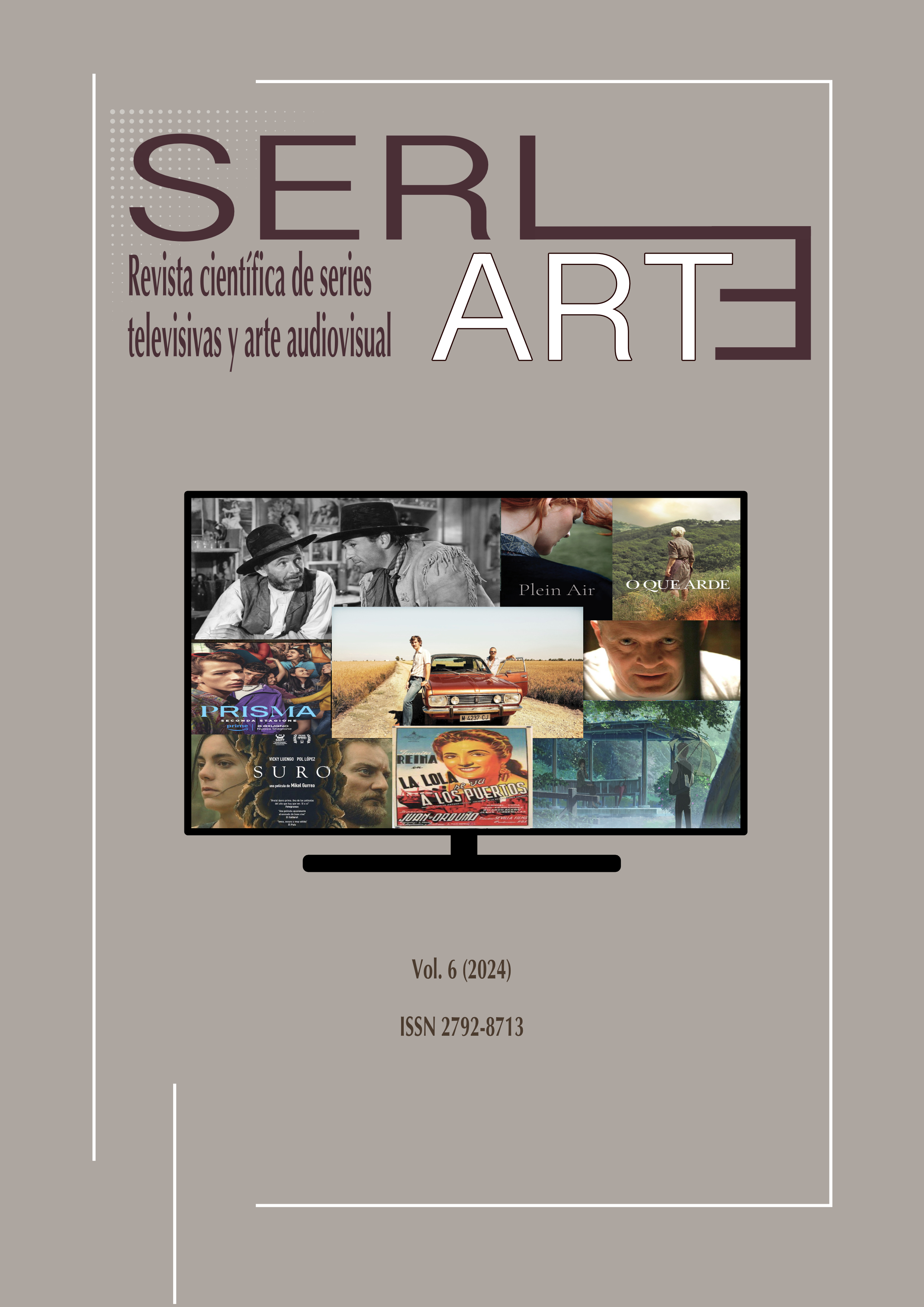Música y tierra. Agricultores vs ganaderos en El Forastero (William Wyler, 1941)
Contenuto principale dell'articolo
Abstract
El conflicto entre agricultores y ganaderos fue uno de los principales problemas con los que tuvieron que lidiar las autoridades norteamericanas durante los años de expansión de la frontera. La tierra como forma de vida, entendida desde un doble punto de vista: como terreno de cultivo y como zona de paso y pasto, llevó a los primeros pobladores del Oeste americano a librar verdaderas batallas legales. En El forastero, William Wyler presentó este conflicto como parte y fondo de una historia de amor y justicia, donde la tierra, como elemento de unión y futuro, termina saliendo vencedora. Entre todos los apartados que dan forma a este concepto, la música de Dimitri Tiomkin adquiere un papel fundamental. Su análisis dentro del contexto de la historia y del género cinematográfico ayuda a construir significados y a transmitir de forma más efectiva la lucha por un medio de vida, y por el futuro.
Downloads
Publication Facts
Reviewer profiles N/A
Author statements
Indexed in
- Publisher
- Ucopress. Cordoba University Press
Dettagli dell'articolo

Questo lavoro è fornito con la licenza Creative Commons Attribuzione - Non commerciale - Non opere derivate 4.0 Internazionale.
Riferimenti bibliografici
«Lobby Card D y E, de la serie de The Westerner (1940)». En: Dimitri Tiomkin. The official Website. https://dimitritiomkin.com/18067/westerner-the-poster-art/ (Fecha de consulta: 20-06-2023)
«The Westerner. Cue Sheet. Dimitri Tiomkin. Page 1». En: Dimitri Tiomkin. The Official Website. https://dimitritiomkin.com/18070/westerner-the-cue-sheet/westerners_the_cue_sheet_scan_tiomkin_08272021_page_1/ (Fecha de consulta: 20-06-2023)
«The Westerner. Cue Sheet. Dimitri Tiomkin. Page 2». En: Dimitri Tiomkin. The Official Website. https://dimitritiomkin.com/18070/westerner-the-cue-sheet/westerners_the_cue_sheet_scan_tiomkin_08272021_page_2/ (Fecha de consulta: 20-06-2023)
«The Westerner. Cue Sheet. Dimitri Tiomkin. Page 3». Dimitri Tiomkin. The Official Website. https://dimitritiomkin.com/18070/westerner-the-cue-sheet/westerners_the_cue_sheet_scan_tiomkin_08272021_page_3/ (Fecha de consulta: 20-06-2023)
«The Westerner. Cue Sheet. Dimitri Tiomkin. Page 4». En: Dimitri Tiomkin. The Official Website. https://dimitritiomkin.com/18070/westerner-the-cue-sheet/westerners_the_cue_sheet_scan_tiomkin_08272021_page_4/ (Fecha de consulta: 20-06-2023)
ALTMAN, Rick (2009), Film/Genre, New York: Bloomsbury.
AMPAS. Margaret Herrick Library. Poster Collection. Poster The westerner (1940). 1A 1946 re-release. 70257551.
AMPAS. Margaret Herrick Library. Special Collections. William Wyler Papers. VINEGARROON. 71363333.
AMPAS. Margaret Herrick Library. Special Collections. William Wyler Papers. COOPER STORY. 71363332.
AMPAS. Margaret Herrick Library. Special Collections. William Wyler Papers. Notes from Jo Swerling, Edwin H. Knopf, and William Wyler, November 22, 1939, November 24, 1939, November 26, 1939, and January 31, 1940. 71363334.
LLOYD Shaw (1950), Cowboy dances. A collection of western square dances. Caldwell: The Caxton Printers.
LOMAX, John A. (1911), «Cowboy songs of the Mexican border», The Sewanee Review, 19, 1, pp. 1-18.
LOMAX, John A. (1922), Cowboy songs and other frontier ballads, New York: The Macmillan Company.
MALONE, Bill C. (2003), Singing cowboys and the musical mountaineers. Southern culture and the roots of country music, Georgia: University of Georgia Press.
MALONE, Bill C. y STRICKLIN, David (1979), Southern Music/American Music, Lexington: University of Kentucky Press.
MAXWELL Brown, Richard (1994), No Duty to Retreat Violence and Values in American History and Society, milNorman: The University of Oklahoma Press.
MILLER, Gabriel (2013), William Wyler. The life and films of Hollywood’s most celebrated director, Lexington: University Press of Kentucky. DOI: https://doi.org/10.5810/kentucky/9780813142098.001.0001
O’CONNEL, Joanne (2016), The life and songs of Stephen Foster. A revealing portrait of the forgotten man behind “Swanee River”, “Beautiful dreamer”, and “My old Kentucky home”, Lanhan:Rowman & Littlefield.
PÉREZ GARCÍA, Lucía (2017), «El paisaje y la música en los westerns de Dimitri Tiomkin», Imafronte, 25, pp. 9-32.
PÉREZ GARCÍA, Lucía (2021), Música de cine en femenino. Las mujeres en la filmografía de Dimitri Tiomkin, Sevilla: Editorial de la Universidad de Sevilla.
RAPEE, E. (1970), Erno Rapee's encyclopaedia of music for pictures, New York: Arno Press & The New York Times.
SANDBURG, Carl (1927), The American songbag, San Diego: Harcout Brace And Company.
STARRS, Paul F. (2000), Let the cowboy ride. Cattle ranching in the American West, Baltimore: Johns Hopkins University Press.
THOMPSON, Joseph M. (2022). «The blues, country music, and American agriculture», en R. D. Hurt (Ed.), A companion to American agricultural history, New Jersey: John Wiley & Sons Ltd, pp. 421-435. DOI: https://doi.org/10.1002/9781119632214.ch30
TIOMKIN, Dimitri y BURANELLI, Prosper (1949), Please don’t hate me, New York. Doubleday & Company.
ZAMECNICK, J.S (1913), Sam Fox moving picture music. Vol. 1, Cleveland: Sam Fox Publishing Co.
ZAMECNICK, J.S. (1913), Sam Fox moving picture music. Vol. 3, Cleveland: Sam Fox Publishing Co.






